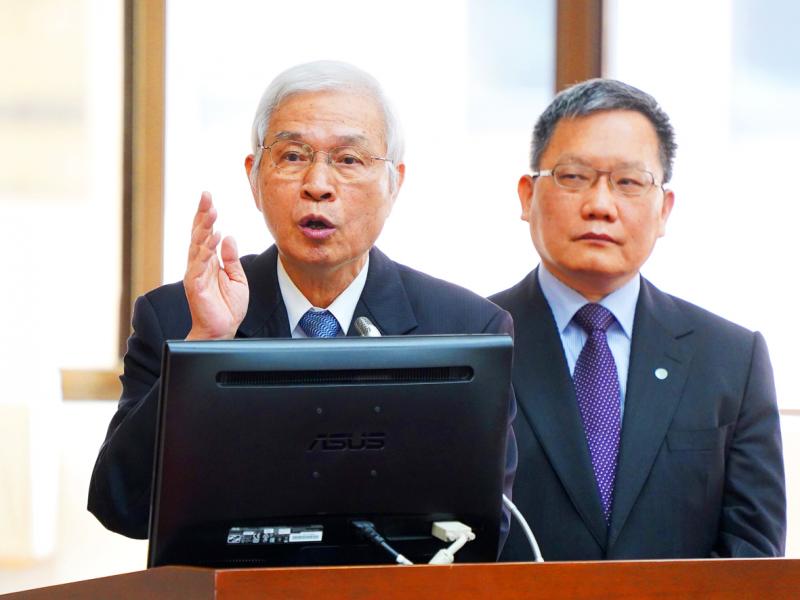Taiwan will not use negative interest rates or quantitative easing to mitigate the impact of the COVID-19 pandemic, as there is still room for interest rate cuts if necessary, central bank Governor Yang Chin-long (楊金龍) told lawmakers in Taipei yesterday.
Lawmakers across party lines voiced concern at a meeting of the Finance Committee on the impact of COVID-19 that the central bank’s actions to reduce the potential economic fallout of the pandemic appear modest compared with its peers around the world.
“There is still room for rate cuts if the coronavirus crisis wreaks a heavier havoc, but there will not be zero or negative interest rates,” Yang said.

Photo: CNA
Consumer prices, financial stability and the nation’s economic showing would guide the bank’s decisions, he said.
The central bank on March 19 cut interest rates by 0.25 percentage points to a record low of 1.125 percent, and announced an injection of NT$200 billion (US$6.61 billion) into the system to ease the financial burden on households and companies from the pandemic.
Lawmakers said that other central banks are taking more aggressive measures to stave off a credit crunch, citing the US Federal Reserve’s 125 basis point rate cut, and unlimited purchases of government and corporate debt as one example.
Yang said the situation in Taiwan is different from that of the US and requires different measures in response.
Quantitative easing is helpful in boosting market confidence and averting a liquidity squeeze, as seen during the global financial crisis of 2008, but large Taiwanese corporations have ample liquidity, making debt purchases unwarranted, he said.
However, travel and quarantine restrictions due to the pandemic have hit service industries hard, while electronics firms are in danger of supply chain disruptions, he said.
This is why the central bank is seeking to channel relief money to small and medium-sized enterprises that are under strain, Yang said.
Yang said that he had personally pleaded with local banks to provide loans at preferential interest rates to affected companies.
Not having to face a cash crunch means companies would be less inclined to lay off employees, thereby putting them in financial difficulties, he said.
The central bank would continue to closely monitor the situation and would expand the size of funding, if necessary, he said.
Yang said that he is confident the pandemic would not create a financial crisis in Taiwan even if it persists beyond the first half of the year, but added that he is less confident about other countries’ financial health.

Intel Corp chief executive officer Lip-Bu Tan (陳立武) is expected to meet with Taiwanese suppliers next month in conjunction with the opening of the Computex Taipei trade show, supply chain sources said on Monday. The visit, the first for Tan to Taiwan since assuming his new post last month, would be aimed at enhancing Intel’s ties with suppliers in Taiwan as he attempts to help turn around the struggling US chipmaker, the sources said. Tan is to hold a banquet to celebrate Intel’s 40-year presence in Taiwan before Computex opens on May 20 and invite dozens of Taiwanese suppliers to exchange views

Application-specific integrated circuit designer Faraday Technology Corp (智原) yesterday said that although revenue this quarter would decline 30 percent from last quarter, it retained its full-year forecast of revenue growth of 100 percent. The company attributed the quarterly drop to a slowdown in customers’ production of chips using Faraday’s advanced packaging technology. The company is still confident about its revenue growth this year, given its strong “design-win” — or the projects it won to help customers design their chips, Faraday president Steve Wang (王國雍) told an online earnings conference. “The design-win this year is better than we expected. We believe we will win

Chizuko Kimura has become the first female sushi chef in the world to win a Michelin star, fulfilling a promise she made to her dying husband to continue his legacy. The 54-year-old Japanese chef regained the Michelin star her late husband, Shunei Kimura, won three years ago for their Sushi Shunei restaurant in Paris. For Shunei Kimura, the star was a dream come true. However, the joy was short-lived. He died from cancer just three months later in June 2022. He was 65. The following year, the restaurant in the heart of Montmartre lost its star rating. Chizuko Kimura insisted that the new star is still down

While China’s leaders use their economic and political might to fight US President Donald Trump’s trade war “to the end,” its army of social media soldiers are embarking on a more humorous campaign online. Trump’s tariff blitz has seen Washington and Beijing impose eye-watering duties on imports from the other, fanning a standoff between the economic superpowers that has sparked global recession fears and sent markets into a tailspin. Trump says his policy is a response to years of being “ripped off” by other countries and aims to bring manufacturing to the US, forcing companies to employ US workers. However, China’s online warriors